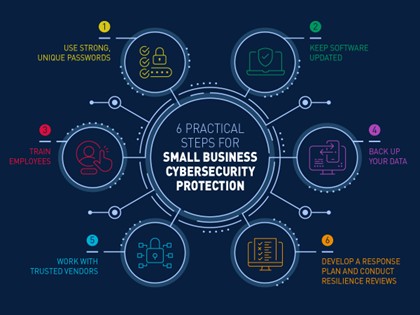Blog by Better Business Bureau
Many small business owners assume that hackers only go after the giants — large corporations with millions of customer records and deep pockets. Unfortunately, the reality is that small businesses are prime targets for cybercrime, and the impact of a single breach can be devastating.
millions of customer records and deep pockets. Unfortunately, the reality is that small businesses are prime targets for cybercrime, and the impact of a single breach can be devastating.
Why Hackers Target Small Businesses
Hackers don’t discriminate based on size; they focus on vulnerability. Small businesses often lack the advanced security systems, dedicated IT staff, and employee training that larger organizations maintain. This makes them easier to exploit.
A single weak password, outdated software patch, or unprotected Wi-Fi network can open the door to sensitive customer data, payment information, or business records. Once breached, recovery costs — legal fees, regulatory fines, customer notifications, and reputational damage — can far exceed what most small businesses are prepared to handle.
The Cost of Being Unprepared
According to the World Economic Forum1, the global cost of cybercrime is projected to reach $10.5 trillion in 2025. Beyond financial losses, a breach can erode customer trust, disrupt employees’ work, and bring daily operations to a standstill.
Smart, Practical Steps to Stay Protected
The good news: you don’t need a Fortune 500 budget to improve cybersecurity. Here are practical steps every small business owner should consider:
Use Strong, Unique Passwords
Require employees to create complex passwords and use a password manager to avoid reusing simple ones. The U.S. Small Business Administration recommends using Multi-Factor Authentication (MFA), which verifies an individual’s identity using more than just a password. Some MFA’s require a PIN, while others use fingerprint or facial recognition. This extra step significantly strengthens your business’s defenses.
Keep Software Updated
Cybercriminals often exploit outdated software. Updates frequently include security patches that fix known vulnerabilities. Enable automatic updates on all devices — from laptops to point-of-sale systems, whenever possible. Keeping operating systems, browsers, and apps up to date helps close security gaps.
Train Employees
Human error is one of the most common causes of breaches. Provide simple training so employees can recognize phishing emails, suspicious links, and unsafe attachments.
Back Up Your Data
Regularly back up critical business files to a secure cloud service or encrypted drive. This ensures business continuity in the event of ransomware or data loss.
Work with Trusted Vendors
From payment processors to marketing platforms, ensure your partners meet security standards and use fraud-prevention tools. One weak link in your supply chain can put your business at risk.
Develop a Response Plan and Conduct Resilience Reviews
Be prepared before an attack happens. Create an incident response plan that outlines how to contain threats, evaluate damage, and recover systems. Test and update it regularly to maintain readiness.
The Bottom Line
Cybersecurity isn’t just an IT problem — it’s a business survival issue. While small businesses may feel “too small to hack,” in reality, their size often makes them more attractive to cybercriminals. By taking proactive, affordable steps today, you can protect your customers, your reputation, and your future.
The Better Business Bureau® is a valuable resource for staying current on the latest cybersecurity threats and best practices. Visit BBB’s cybersecurity HQ to learn more. Start small, stay consistent, and remember: when it comes to cybersecurity, preparation is your strongest defense.
This article was edited with the help of ChatGPT.



 millions of customer records and deep pockets. Unfortunately, the reality is that small businesses are prime targets for cybercrime, and the impact of a single breach can be devastating.
millions of customer records and deep pockets. Unfortunately, the reality is that small businesses are prime targets for cybercrime, and the impact of a single breach can be devastating.